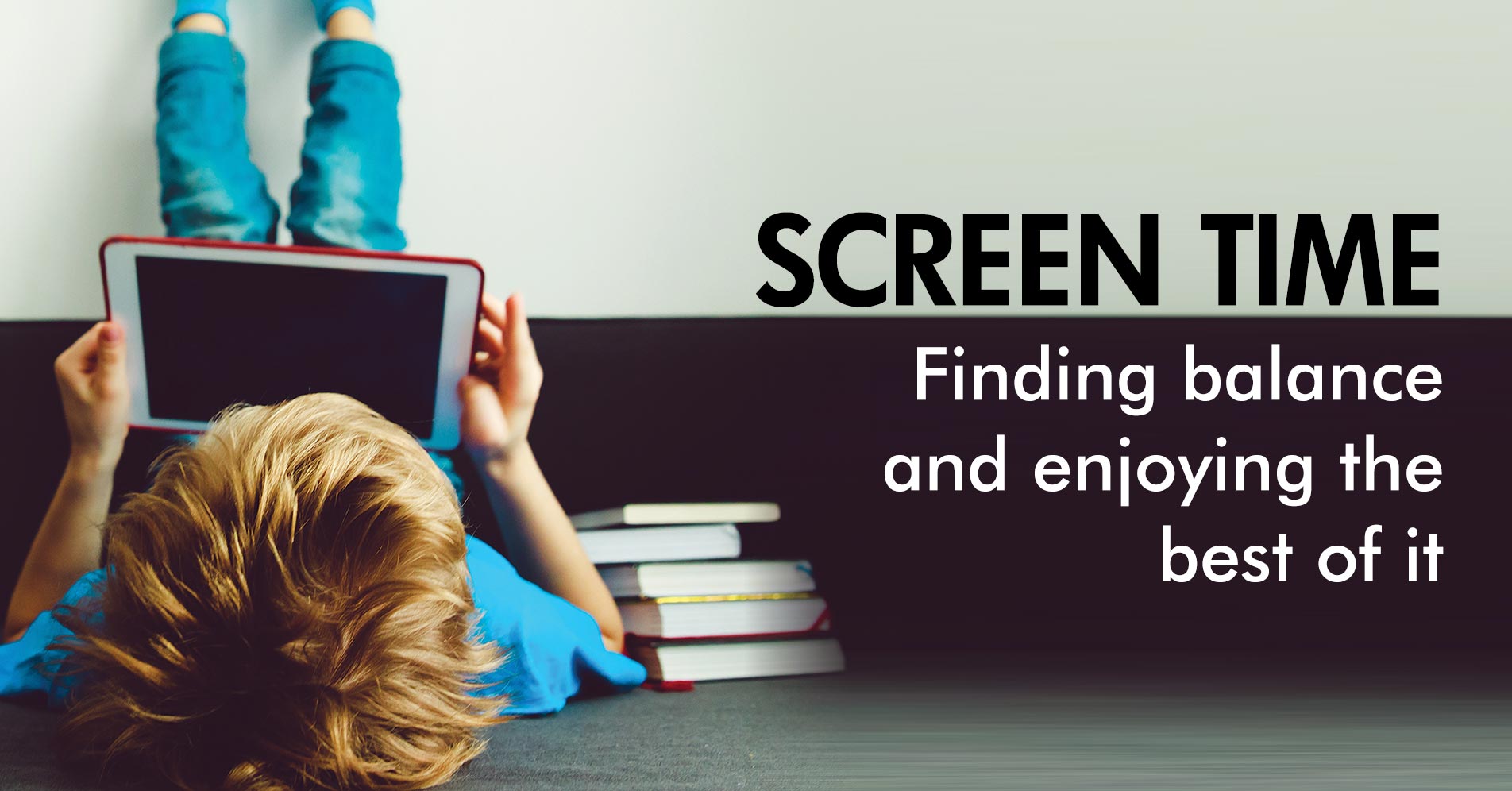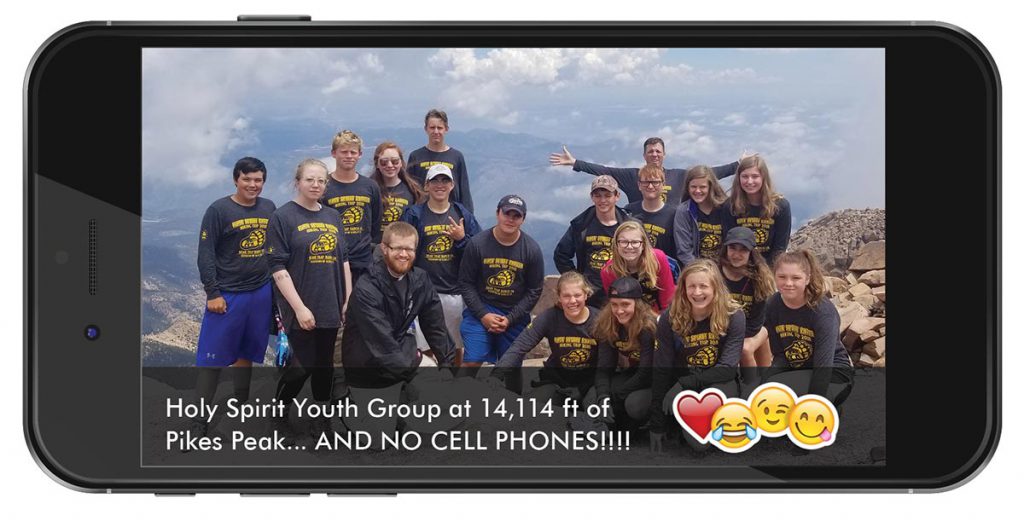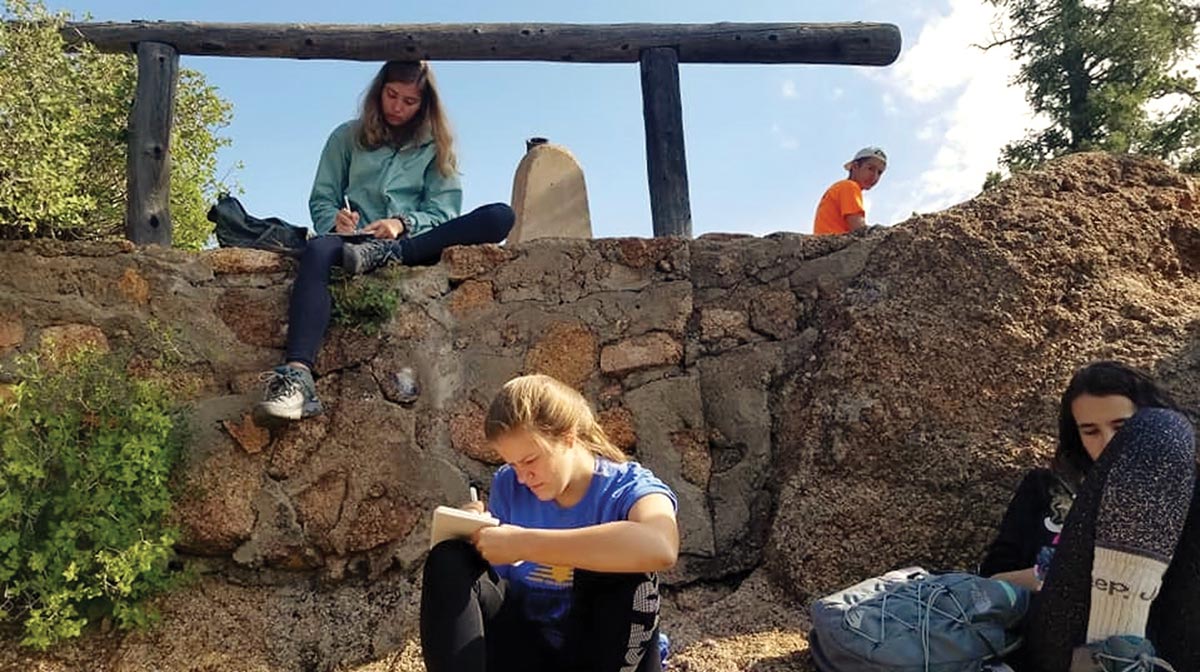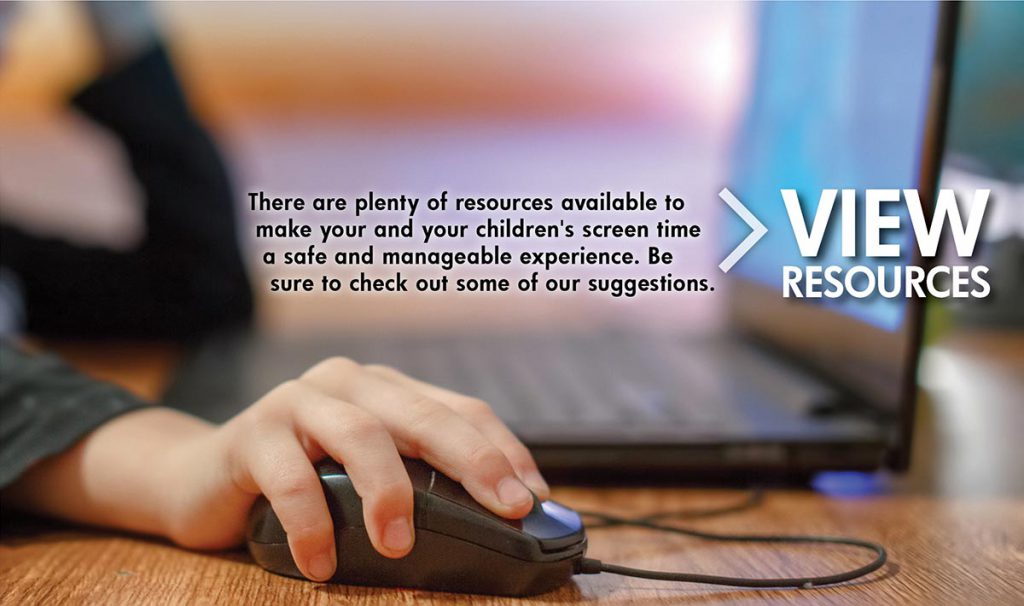

You send a text and await the response – you might even do so while driving.
You check once more in case that email arrived.
Maybe just one more episode of the latest Netflix series.
Any new tweets on Twitter or pictures on Instagram?
So what if I’ve seen this “Everybody Loves Raymond” rerun six times before.
Oh, look at that, Mary has another Facebook post – that looks like a good recipe.
Man. I’ve just got to get to that next level on the current game I’m sort of (deeply) addicted to.
The screens that most of us stare at each day have enormous power in our lives.
They can lead us away from spending time with others, they can lead us into dangers like bullying and pornography, and they can allow a deployed father be present via skype for the birth of his child.
Our cumulative time watching screens – movie, television, computer, tablet, phone and even watches – runs into many hours each day.
But how much time do we spend thinking about what we, and in many cases what our children, are doing? Might it be helpful to consume with some consciousness? What is all this screen time doing to us?
Well, asking those type of questions, according to experts dealing with media literacy, mental health, technology, and spirituality, can actually be an important step in learning balance and moderation, which leads to more healthy long-term use of our screens.

“There are two ways to get to the point of controlling all the media in our lives” said Sr. Rose Pacatte, FSP, D.Min., a longtime media literacy education specialist.
“The first is to articulate the values that guide your life, those overarching transcendent ideals, such as family, community, integrity, love, service, faith, hope. The next thing is to articulate the plan you have for your family and outline goals so you can fulfill that plan.
“Prioritize what you value in your life (family, education, church and spiritual development, work, community, good citizenship, health of mind, body, soul, recreation and leisure) and then choose to do your very best to keep to the plan,” she said.
Mary Weber, a counselor with Catholic Family Services who specializes in working with children, said finding balance and moderation are keys, especially for young minds.
“As young children’s brains are developing, they are especially vulnerable to input,” Weber said.
“The younger the child, the more hands on they are in how they learn. A screen does not provide the same opportunity for experiential learning, creativity, problem solving vs. toys, or playtime with family and friends for example. Screen time can be used for enjoyment and some learning opportunities but in moderation. Some virtual games can be overstimulating if played too long and children can become irritable.
“Younger children are very concrete in their thinking. It isn’t until they are closer to 11 or 12 that they can fully understand abstract thought so there is a risk of younger children struggling with separating out fantasy from reality if engrossed too much in a game. Also for younger children, if video games are too violent, it can desensitize them to violence or graphic language,” Weber said.
But of course this is not just about children. The mental health community is discussing whether to add a diagnosis of something called “internet addiction disorder” for those who are dealing with issues because they are overly consumed by screens.
Catholic Family Services counselor Justin Falon said easy access for everyone is part of the problem.
“In my opinion one of the things that makes or will make this issue so problematic is access … Screens are convenient. Did you know that some people even text and drive or browse and drive? That speaks to the magnitude of the problem,” he said.
“Is that text really so important that we need to read it while driving home? Probably not but our brains don’t work like that. Our brains are being programmed to receive the reward (reading the text or email while driving) even though we know that it’s dangerous. We take the risks.
“What people need to know is that when we use drugs, we are taking the risk. When we use alcohol, we are taking the risk. When we browse excessively or text while driving, we are taking the risk.
“But, it’s legal and that is how we sometimes justify it to ourselves. In my mind, it all works on the same pleasure center in our brains. We do the things that make us feel good. It’s that simple and that complicated,” Falon said.
No one is suggesting screens do not offer much that is good. A good portion of the population uses screens in their daily work. Families who find themselves spread across the globe use tools like FaceTime and WhatsApp and Skype to stay in touch – in relationship.
And it is respecting relationships that is at the heart of using technology well.
 Sean Hanson, youth director at Holy Spirit, Sioux Falls, tells of what happened on a Colorado hiking trip with 19 teens – days filled with hiking, rock climbing and also adoration and Mass.
Sean Hanson, youth director at Holy Spirit, Sioux Falls, tells of what happened on a Colorado hiking trip with 19 teens – days filled with hiking, rock climbing and also adoration and Mass.
But no cell phones.
“For one we wanted them to connect with God’s nature and be to present with our community. And second, phones would not work up there,” he said.
“This group became a family and it was amazing to see. I had two teens say that they did not want to go back …. The first teen response was that she learned to live without her cell. She had realized that her phone was not important and was taking away from true personal relationships. Communicating with people around her was more important. She said she was at peace up in the mountains and did not worry about what people had to say on social media and what society had to say,” Hanson said.
“The second teen said that she was at peace up here because she was not being pushed to be busy. She felt that she had a better understanding of life and its meaning. She said that her parents push her so hard on activities and academics. On top of that, she said society tells you if you are not busy doing something that you will be a failure in life.
“My opinion is that these teens were able to see what life was really about and how their relationship could be with Jesus. The teens are saying that they are too busy. And it’s no wonder why Jesus gets ranked 3rd or 4th place in teen’s life sometimes,” Hanson said.

Since the key relationship in our lives is the one with God, we begin to see how being out of balance with how we use screen time – whether for work, social media or anything else – can impact our spiritual life.
Father Andrew Dickinson uses social media himself but also observes its use by students at South Dakota State University where he directs the Pius XII Newman Center.
“Two main spiritual reflections should be considered,” he said.
“First is social media as a near occasion of the sin of acedia. Acedia, sometimes called sloth, is a temptation to be dissatisfied with your current situation and to run from your current duties.
“As baptized Christians we believe that we have a share in Jesus’ own mission by the power of His Holy Spirit, thus no situation should ever be boring, we can always ask our Lord ‘What do you want me to do right now? How are you trying to love me and love others right now?’ Social media then pulls us away from daily responsibilities and tasks.
“The second spiritual consideration is that it removes us from the call of charity. The charity of Jesus calls us to love our neighbor and social media can create confusion on who is our neighbor in need,” said Fr. Dickinson.
“While social media can create confusion as to who is our neighbor in need, it can expand our ability to love our neighbor in Christian charity.
“Just this August my attention was drawn to an Olympic wrestler who suffered a debilitating injury. I could remotely assist him and his family with a small donation and ongoing prayers.
“Social media also allows people who often feel overwhelmed and overlooked to connect with some others – but again, the connection is ethereal and largely unsatisfying in the long run.
“The most important thing, and, at the end of the day, the simplest reminder, is ‘does what I am doing prepare me for heaven?’ Another way to ask it, ‘Jesus, what do you want me to be doing with my life, right now?’
“On a less spiritual note, ‘Does this really refresh me for doing my daily responsibilities or is it just a chasing after a distraction?’” said Fr. Dickinson.
Finding a meaningful, uplifting way to use social media and to be reflective of her own screen time use eventually led Jen Dykstra to regular commentaries on scripture verses that she shares on her Facebook page.
“It probably started about four years ago or so and there was so much negativity around. I was looking for encouragement and often scanned the USCCB website for the daily readings,” said Dykstra, a member at Holy Spirit, Sioux Falls, who works in the financial industry.
“I have a morning routine, part of which is seeking Bible verses that speak to me and then I write a reflection on it, trying to encourage and counter the negativity. I do it for myself but share it,” she said.
It has become meaningful for others too. Dykstra tells of someone who told her she reads her morning posts, copies and shares the reflections with her college age kids. She recently missed a day and they complained about not getting it.
Dykstra said her motivation is not only about thoughtful use of her screen time, but about doing things that can make a difference for herself and for others.
“It’s easy to get caught up, especially in negativity or jealousy of what you think others have. What you see on social media is just a snapshot of their whole life. Seeing those things doesn’t mean you know them. To know them you must reach out and develop a relationship,” Dykstra said.
When in doubt about proper use of our screen time, Sr. Pacatte recommends seeking the advice of a saint.
“St. Augustine said, ‘Love God and do what you will.’ This means that if you or I affirm our love for God, we will do what is right and good and according to our rightly formed consciences, that is, right living in line with the teachings of Jesus as interpreted for us by the Church,” she said.
“This implies living an active life of faith that will inspire us when it is time to make choices regarding media and ourselves and our families. The media in whatever form we have today or that is coming tomorrow are not going away. We can love the technology or hate it but media are not going away,” said Sr. Pacatte.



